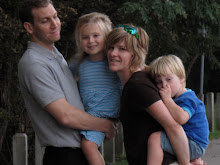I feel like I'm in the middle of big changes. A sort of paradigm shift, a change of the lens through which I view my life and my children and the world in general. I've been reading this book--
Playful Parenting--and at first I didn't think it was saying anything so radical. Its premise is to help children work out their fears and anxieties and conflicts through play rather than through talking to them (which generally falls on deaf ears), but it's also about discipline. The author makes the case against timeout as a concept, which has got me thinking. He argues that misbehavior is simply the result of a child's feeling a lack of connection and then acting out, and that timeout only further isolates the child, so it actually is harmful. In addition, if you just send the kid to timeout, you give up the chance to really teach, which is ultimately what we want to do anyway. It's not all quite as simple as that...
What has happened is that I've started playing with F differently. We now play games that are connected to our conflicts. For ex, we have one game where I hold the babydoll and she hits her. The doll cries big racking sobs and Frances has to go into timeout until the bell rings (which is about 3 seconds), then she comes over and hugs the baby and kisses her and tells her she's sorry, and then she hits her again. There's another where I crawl around on the floor pretending to be Clark. She pushes me over and I cry, and when I cry I sort of fall on her and grab her in a big hug and roll around on the floor with her while I sob. She thinks both these games are hilarious. At first I didn't know what I thought about them, about whether they would help her work through the problems we have with her hitting or pushing Clark, but the book is rather insistent that you should follow the child's lead in the game and play it however she wants to. (which means let the child overtly direct play by telling you what to do, or do whatever makes the child giggle which is the sign you are at the right place.) He says not to worry about what actually happens in the game, that the child is able to differentiate play from real life and that the play allows her to let off steam about a real situation that gives her anxiety.
The other thing that's changed with her is the way I respond to her "NO!" I used to just say as calmly as I could, "yes, it is time for your nap" or "yes, you've already had your vitamin today and can't have 10 more." Of course, we'd just go back and forth, her will against mine. A few times now, instead, I've sort of mimicked her in an over-exaggerated way. I act like a toddler and stamp my foot and holler as loudly as she does. Sometimes I'll say, "NO!" taking the same side, or sometimes I'll say, "YES!" and sometimes I switch back and forth without reason. She really laughs at this. It must be funny to see Mom acting this way. It breaks the tension and makes our interaction that of play rather than that of Mom against Kid. And we just move on from whatever conflict we had.
The result of these is that Frances is noticeably more agreeable. She's happier. She's less clingy, less needy, more willing to go to bed without bargaining for another story, another kiss from Dad, some water, to be held. Maybe some of this change is just developmental and would have happened anyway, but I don't think so. For awhile she was having tantrums at least once a day, sometimes ten a day. I can't actually tell you the last time she had a tantrum. Not yesterday; not all weekend; I don't think last week even.
And I feel closer to her. That's the best part. I think this approach of play has somehow allowed me to open to her in a very literal way. The book suggests that we as humans want to connect, need to connect, and that play helps us do that with our children because we are meeting them at
their level, coming into their world to join them. What's odd about it is that it appears so far to simply be a side effect of changing my actions toward her. If only all our problems took as little emotional energy to solve.



